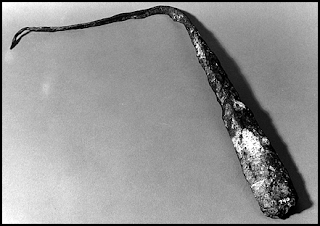Let's start…
He invented a musical instrument called glass armonica. Mozart wrote two pieces for the armonica, including "Adagio and Rondo 617," and in 1815, Beethoven wrote a short melodrama where a narrator told a story while accompanied by armonica.
He also invented an efficient stove providing more heat and less smoke than an ordinary open fireplace. His stove was described by his contemporaries as giving off twice the amount of heat as a normal fireplace for a third of the wood consumed.

Along many many discoveries in electricity, he who invented lightning rod and saved millions of houses from thunder. Thanks to him, thunders were no longer disastrous.
The same guy was also the first one to observe Gulfstream currents.
These were only a couple of his inventions.
Who was it? Maybe this image would help.
It was Benjamin Franklin.
Benjamin Franklin (1703-1790) was born in Boston, as the youngest of 17 brothers. His father had a candle-shop, and his mother probably spent all her life with house work as a mother of 17 children.
His family was not wealthy or intellectual thus his family has never been a major factor of his success. Though, as I understand, they supported learning and to some extent Franklin's life choices.
He is sent to Latin school to learn theology at the age of eight. But he was not interested in it. His father Josiah, observes Benjamin's lack of motivation and takes him out of school. They afterwards search for a suitable job for 10 year old Ben.
As a child, he has a hunger for information of all kind and his father's library helps him a lot He spent many hours reading books from various kinds. He reads from Socrates to John Locke, at a very young age and continues reading all through his life.
Primarily, Ben works for a relative who repairs knife. He dislikes the job so with his father they search a more suitable job for him. Printing seems interesting for him, as it involves getting involved with books, so finally he starts as an apprentice in a printing shop. (He continues in this profession until he retires on age 42, in addition between many other professions he was given, he identifies himself as a printer on his will.)
After disagreements with the owner of the printing shop, he goes to New York in the hopes of a new job. Not finding in New York a printing shop to give him a job, he hears about some opportunities in Philadelphia. Therefore, he moves to Philadelphia for work.
In Philadelphia, he starts to write columns with fake names. Poor Richard's Almanac gains extensive popularity.
While spending many hours at work, he never neglects reading and more importantly thinking about everything. He forms a small discussion group, named Junto, where every Friday they discuss various topics. The topics may differ from public problems to scientific inventions, about everything that is helpful to discuss. Ben's Junto becomes so popular that other discussion groups are formed within the city.
Basically, as he continues to work in Printing( after a while as an owner of a printing house) he constantly thinks about the world around him, and this constant thinking and learning, helps him develop from very creative solutions to major public problems, to inventions in very challenging scientific areas.
He thinks, he researches, and he observes. Not on some major area, but basically in all areas.
He formed:
- the First Fire Department in Philadelphia
- City Cleaning System
- An Academy for poor children (Now became University of Pennsylvania)
- First Hospital in Philadelphia.
Namely a few.
He found a way to pass American Indian language to writing. Also he was the one who first used caricatures and question-answer technique in journalism.
He invented Glass Harmonica, a musical instrument composed of various sized glass cups.
He was the first to observe Gulfstream currents in the ocean, and thus proposed a better trajectory to pass the Atlantic.
Condenser, conductor, charge, discharge, battery, electrical choke, positive and negative electricity, plus – minus charges. These notions were introduced by him.
He discovered the difference between electricity and thunder. This discovery led to the invention of lightning rod. Thanks to him, millions of houses worldwide were protected from thunders.
I didn't even start to write about his role in politics and diplomatic achievements!!
- He was the first to propose the idea of union of states and a centralized government in 1751 (Albany Plan) His plan was not approved in the first time but after 20 years, his model gets acceptance.
- He represented colony in London for years
- He opposed to the Stamp act which was meant to burden excessive taxes upon colony
- He served as a delegate in Continental Congress and took place in the committee that prepared the draft of Deceleration of Independence.
- He seeks economic and military aid in France for America. With his efforts France assured critical military assistance to America. He also played a crucial role in bringing about the final peace treaty with Britain in 1783.
- After United States of America was founded, in 1785 at the age of 82, he gets elected as the President of the state of Pennsylvania.
He dies in 1790 at the age of 87.
I'm sure I forgot to mention some of his critical roles and contributions thus my intention was to give a brief resume of Benjamin Franklin.
I really can't understand how he could do all this, but he really did. I ask myself how it can be possible to succeed in so many different areas. Still, I guess the case of Benjamin Franklin motivates all to pass boundaries.
Think, Discuss, Observe. Maybe that was the key to his success. Never give up. Always learn other thinges.
Well, he was a great man, that's for sure!







Post a Comment